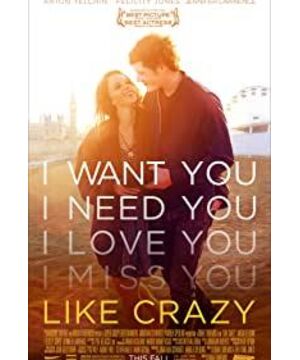Regarding "Love Is Crazy", regardless of its deliberately artificial artistic elements, its core is nothing more than a simple truth: the powerlessness of true love in the face of time.
I don’t know whether it was the independent shaking shots, beautiful sentences, moving protagonists, and romantic scenery that infected me, or the sincere feelings that were concealed by film techniques that touched me. In short, "Love Is Crazy" It made me sad for a while. This kind of sadness is not the sadness of life and death that shakes the mountains, but a strong sense of helplessness to the world's volatility. It's like a secret hidden in my heart that I dare not say, but in fact, that secret is no longer a secret.
Many people must have experienced the pain of separation soon after falling in love. The idea of hesitating a little longer, or simply being a little mad and letting you go, desperate, must have been buried by many people. It's just that some people have not been able to sow this kind of "madness" in the face of reality. I saw a lot of people commenting that they don’t understand that the heroine knows the seriousness of the passport expiration and has to stay with the hero. They think this setting is a bit deliberate and untenable, because they must have not experienced the real "crazy". , Or else he is a too rational person. I can understand the female protagonist’s "crazy thoughts" very well. I can also feel her feeling of "not painful" for a while because of the consequences, and the farewell words of the male protagonist that "this is almost killing me" are definitely not. Exaggeration, in the face of love, whether you are a hormonal or a spiritual force at this time, such "crazy", "relentless", or even loss, are behaviors that do not need to be explained by common sense.
I really like the title "Like Crazy" (Like Crazy). The moment I love you so much, I want to see you and do everything. I believe that what the heroine said, "I can't find the kind of feeling to you for others", if there is a definition of true love, this would be more appropriate. But, slowly, when Love lost the "young frivolous" at the time and revealed its true and cruel body, I was somewhat surprised.
The two people who have gone through untold hardships finally reunite in a broken mirror, but why do the two embracing seem to be alienated instead. The mirror has been broken so many times, no matter how much passion and enthusiasm is cruelly kneaded and shattered, the moment of making up, no matter how complete it is, it will not be able to go back to the original. Too many cracks have made true love haggard. At that moment, It's not that I don't love you, but that I have no strength. When they were separated, the two had their own good careers. The male owner's own furniture business prospered freely, and the female owner changed from a small soldier to an associate editor. They also had a new love and a completely different circle. It is not distance, but time, or reality, that separates the two of them. The reality goes too fast, but each other is still like the first love in the memory, but the two now don't need the support of the first love.
In the last scene, although the director stopped here and did not give any ending, I thought it was the simplest and most shocking finishing touch. The two showering together, in the audience's expectation, should have been a passionate segment, but staged a scene of heavy embracing. The water flowing out of the shower scoured the two of them, but it could not wash away the abrasion in their hearts. The film suddenly returned to the warm scene. In the memory, it was the sweetness of the two who had just been together. The eyes were full of expectation and seemingly endless love and pity. And returning to the cold bathroom at the moment, it was the female protagonist who walked away, and the male protagonist looked at her back with silent and hollow eyes. True love seems to have not withstood the test of time, and the best time has become a memorial. But it does not mean that we have not owned it.
This reminds me of the ending of "Blue Valentine's Day", the clips of marriage and divorce intertwined, and the two are drifting away. We all know in our hearts that they still love each other deep down in their hearts, but the loved one may stay the way you were 10 years ago, or I don’t know how to love you anymore. This may be the difference between this kind of well-received film and ordinary love stories. I'm used to seeing those happily finally married family members, thinking that that is the best definition and ending of true love. I don't know that it is just an illusion of electro-optical phantom. And "Crazy" and "Blue" are both illusions and reality, at least for the moment I think they are.
At least the last picture I saw was pitch black, and then, the ending credits.
View more about Like Crazy reviews











